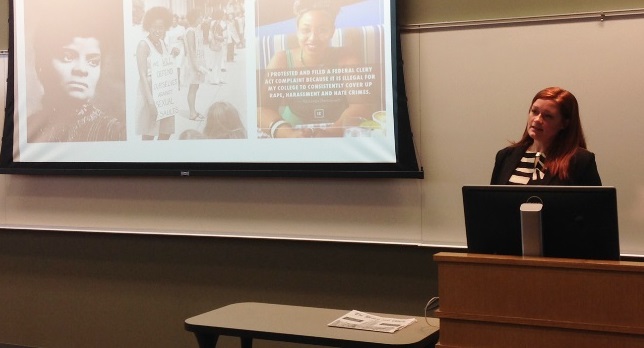A voice for “Ending Rape on Campus”
“College is a risk factor for rape.” The words lingered on the screen in front of a full house in STEPS 101 as Danielle Dirks, assistant professor of sociology at Occidental College, explained the evolution of the End Rape on Campus movement.
Dirks’ lecture on March 24 was co-sponsored by the Africana Studies program, the Women, Gender and Sexuality Studies program, and the Women’s Center, and was part of Women’s Empowerment Week at Lehigh.
An academic becomes an activist
A sociologist focusing on criminology, Dirks teaches a course on sexual violence. She was troubled that her students didn’t know the basic FBI definition of sexual assault. When students who were survivors started visiting her during office hours, Dirks’ academic work become much more tangible.
“I was hearing the kinds of things students had gone through not only as survivors of sexual assault, but then also encountering what is called institutional betrayal,” Dirks said. “That’s when an institution that you think is supposed to support you and help you turns its back on you, compounding the trauma.”
Dirks grew concerned that students on campuses everywhere were in danger if they didn’t have the tools to communicate about what was happening and if they didn’t understand their rights.
“If you don’t know what to do when something is happening, you don’t feel empowered to intervene,” she said.
In her research and writing, Dirks has become a voice in a growing national conversation on campus sexual assault. She has also become involved in a movement to improve Occidental’s response to sexual assault. Now, she is traveling to other campuses to share what she has learned with a wider audience.
Dispelling myths
Despite recent high profile stories of falsely reported sexual assault, said Dirks, rape happens on college campuses across the United States. According to Dirks, one in five college women and six percent of college men will experience sexual assault. Only 12 percent of assaults are reported; of those reported, the percentage of false reports is in the single digits.
Dirks told the audience that much of the rape-avoidance education that college students receive is founded on myths. For instance, while women are told to stick with people they know at parties, nine out of ten sexual assault victims knew their rapists.
Perhaps the biggest myth of campus sexual assault is that it often stems from miscommunication fueled by alcohol. Research indicates that a tiny fraction of men—4 to 6 percent—is perpetrating about 91 percent of campus rapes.
Regardless of what a survivor wore or drank, or whom they were with, Dirks said, “100 percent of rape is caused by rapists.”
Allison Howard ’15, who works in the Women’s Center, found Dirks’ presentation surprising.
“She really focused on the idea that there are people who make the conscious decision to be rapists,” said Howard. “You hear about alcohol being a big factor, so you don’t really think about active rapists trying to get away with it. It sounds more predatory.”
A national movement
Dirks’ prior research focused on the complicated intersection of race and the justice system. She traced today’s movement to end sexual violence back to the nineteenth century.
“Historically in the United States, we had laws that only made it illegal to rape white women. Black men were being lynched for any allegation of sexual impropriety toward white women. But at the same time, black women were being raped by white men with virtual impunity.”
This hypocrisy fueled a feminist movement led by African-American activists, Dirks said. In the more recent past, citing the Clery Act, she noted Lehigh’s own role in exposing the need for federally mandated reporting of campus crime.
Using social media tools from Twitter to YouTube, the campus-based movement to end campus rape is connecting with and educating students about their rights and about the protections they have under Title IX as survivors of sexual assault on their campuses.
Transparency and consent
Dirks now advocates for greater transparency on the part of institutions through an annual nationwide campus climate survey. She also favors clearly defined affirmative verbal consent to eliminate gray areas in interpretation.
Although the topic is, as she admitted, “a bummer,” Dirks is optimistic that change can happen.
“There are a lot of campuses that care about this issue,” she said. “I think the White House Task Force guidelines that have come out have really had schools rethink their approach to sexual violence. And I think the number of schools under federal investigation is forcing schools to pay attention to this issue in ways they may previously not have.”
Posted on:


